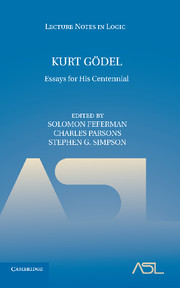Book contents
- Frontmatter
- Contents
- Introduction
- GENERAL
- PROOF THEORY
- Gödel and the metamathematical tradition
- Only two letters: The correspondence between Herbrand and Gödel
- Gödel's reformulation of Gentzen's first consistency proof for arithmetic: The no-counterexample interpretation
- Gödel on intuition and on Hilbert's finitism
- The Gödel hierarchy and reverse mathematics
- On the outside looking in: A caution about conservativeness
- SET THEORY
- PHILOSOPHY OF MATHEMATICS
The Gödel hierarchy and reverse mathematics
Published online by Cambridge University Press: 04 August 2010
- Frontmatter
- Contents
- Introduction
- GENERAL
- PROOF THEORY
- Gödel and the metamathematical tradition
- Only two letters: The correspondence between Herbrand and Gödel
- Gödel's reformulation of Gentzen's first consistency proof for arithmetic: The no-counterexample interpretation
- Gödel on intuition and on Hilbert's finitism
- The Gödel hierarchy and reverse mathematics
- On the outside looking in: A caution about conservativeness
- SET THEORY
- PHILOSOPHY OF MATHEMATICS
Summary
§1. The Hilbert problems and Hilbert's Program. In 1900 the great mathematician David Hilbert laid down a list of 23 mathematical problems which exercised a great influence on subsequent mathematical research. From the perspective of foundational studies, it is noteworthy that Hilbert's Problems 1 and 2 are squarely in the area of foundations of mathematics, while Problems 10 and 17 turned out to be closely related to mathematical logic.
1. Cantor's Problem of the Cardinal Number of the Continuum.
2. Compatibility of the Arithmetical Axioms.
10. Determination of the Solvability of a Diophantine Equation.
17. Expression of Definite Forms by Squares.
Our starting point here is Problem 2, the consistency (= “compatibility”) of the arithmetical axioms. In a later paper published in 1926, Hilbert further elaborated his ideas on the importance of consistency proofs. Hilbert's Program asks for a finitistic consistency proof for all of mathematics. Although we are not concerned with consistency proofs in Hilbert's sense, we are interested in certain logical structures which grew out of Hilbert's original concerns.
In answer to Hilbert's Problem 2 and Hilbert's Program, Gödel proved the famous Incompleteness Theorems. Let T be any theory in the predicate calculus satisfying certain well-known mild conditions. Then we have the following results:
T is incomplete (First Incompleteness Theorem, Gödel 1931).
The statement “T is consistent” is not a theorem of T
(Second Incompleteness Theorem, Gödel 1931).
[…]
Information
- Type
- Chapter
- Information
- Kurt GödelEssays for his Centennial, pp. 109 - 127Publisher: Cambridge University PressPrint publication year: 2010
Accessibility standard: Unknown
Why this information is here
This section outlines the accessibility features of this content - including support for screen readers, full keyboard navigation and high-contrast display options. This may not be relevant for you.Accessibility Information
- 12
- Cited by
